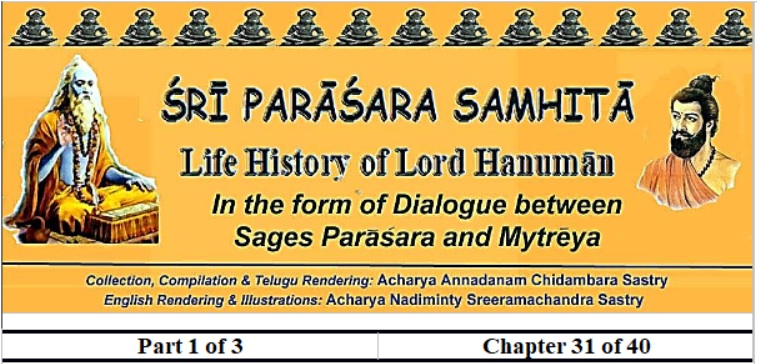
31st Chapter (Ēkatrimśatitama Paţalah)
“Killing of Triśūlarōma”
(Triśūlarōmavadha)
श्रीमैत्रये :-
श्लोक:।।
विघ्नशांतिमभिप्रीत्या मारुतिर्लोकरक्षण:
अकरोंत्किं वद स्वामिन् यद्यस्ति मयि ते दया।। 1
Sage Mytrēya:
“Oh! Great soul! Great Seer Parāśara! Be kind to me and do tell me what the savior of the world Lord Hanumān did to remove the obstruction to the ritual of the sages”. (1)
श्रीपराशर:
प्रसारयति हस्ताग्रं हविर्भागेच्छया सुर:
निपतन्मूर्घ्नि वृक्षाग्रात् कपीन्द्रो तस्य रक्षस:।। 2
Seer Parāśara:
The Epic Fight
“As the demon extended his arm to grab the offeings in the ritual, Hanumān jumped off the tree on his head. (2)
पतनाद्वज्रसंकाशात् कुक्षिस्थजगत: कपे:
दृष्ट्वा स्वरसनां दैत्य: पपात धरणीतले।। 3
Due to that jump of Hanumān, who is actually the entire world, the demon fell with tongue hanging out, as though struck by lightening. (3)
पातयित्वा दुरात्मानमुत्पपात पुन: कपि:
दैत्यो निवृत्तमूर्छस्सन् दिशोदश विलोकयन्।। 4
Felling the demon on the ground, Hanumān jumped up again. That evil demon recovered from the swoon and looking all around, (4)
तं ददर्शान्तरक्षिस्थं गतिलाघवसंयुतम्
उत्पपाताथ दैत्यो पि तं देशं यत्र मारुति:।। 5
Seeing Hanumān easily flying into the sky, that demon too jumped to the place where Hanumān is. (5)
तमुत्पतंतं हनुमान् समीक्ष्य वै
जघान वालेन कठोरवक्षसि
त्रिशूलरोमा पि गृहीतवालधी:
निपातयामास सुवर्चलापतिम्।। 6
Seeing the demon so flying, Hanumān hit Him on his chest with His tail. Triśūlarōma held that tail and felld Hanumān the spouse of Suvarcchala. (6)
अस्पृष्ट्वैव भुवं सद्य: पुनरुत्प्लुत्य मारुति:
जगृहे कन्धरांतस्य राहुश्चन्द्रमसं यथा।। 7
Immediately Hanumān jumped again even without touching the ground and caught the demon by the throat, like evil planetlet Rāhu holding the Sun (actually Lunar Eclipse). (7)
निवृत्तनयनस्तेन नासाभ्यां त्यक्तशोणितम्।
आत्मानन्तु स नस्मार दृढकण्ठग्रहेण स:।। 8
The demon was greatly injured because of his throat being caught tightly, not noticing even the blood gushing out of his own nose. (8)
तत्प्राणसंकटान्दृष्ट्वा सर्वभूतदयापर:
स्कन्धं तस्यारुरोहाथ गलनालं विसृज्य स:।। 9
Seeing that his life is in danger, Hanumān the most merciful against all creatures freed his throat and got on to the shoulders of Triśūlarōma. (9)
विक्रमं कपिराजस्य दृष्ट्वा मुनिगणास्तदा
विस्मयं परमं जग्मु:! दृष्टवन्त: परस्परम्।। 10
Seeing the great valour of the greatest among monkey warriors, the sages were looking at each other out of great surprise. (10)
इतरे कपयस्तूष्णीमासन् हनुमदाज्ञया
नचेलुर्नच सम्पेतु: न बिभ्युर्नच बभ्रम।। 11
All the other monkey warriors remained quiet, still and fearless because of the command by Hanumān. (11)
निजस्कन्धं समारूढं निपपातेहया कपिम्
कम्पायामास दुष्टात्मा निजदेहं स राक्षस:।। 12
That evil doer demon shook his body violently so as to get Hanumān off his shoulders. (12)
तथाप्यपतमाने·स्मिन्नधोमुखमथापतत्।।
पतमानन्तु तं दृष्ट्वा कपिराजो महामति:।
अपसार्य शनै: पश्चात् जानुघातैरघातयत्।। 13
Seeing that Hanumān is not falling even after that, the demon suddenly bent forwards to throw Him off; but wise Hanumān jumped off backwords and gave him a mighty kick with his knee. (13)
तत: क्रुद्धो महाकाय: गृहीत्वा बालधौ कपिम्
भ्रामयामास संरंभत्सनालमिव पंकजम्।। 14
Then the highly angered giant demon caught hold of Hanumān’s tail and twirled him around like one holds the stalk of a lotus and twirls it. (14)
ततो मुनिगणास्सर्वे भीतभीतमिवाभवन्
इंद्राद्या अपि देवाश्च संशयापन्नमानसा:
अंतरिक्षे स्थित:प्रोचु: भूयान्मारुतये शुभम्।। 15
All the sages got frightened at it. Indra and other gods watching from the sky developed doubts about Hanumān s victory, started shouting ‘auspeciousness to the Son of the Wind God’ and wished him well. (15)
हनुमान्विजयस्वेति कुरु दुष्टवधं प्रभो
देवेभ्य: कुशलं भूयात् ब्राह्मणेभ्य: शुभं तथा।। 16
‘Oh! Hanumān! Victory to you. Oh! Great soul! Destroy the evil doers. May the gods be secure. Auspeciousness be there to the Brāhmin people’. (16)
इत्येवं विविधास्तेषां कपिश्श्रुत्वा जयाशिष:
अद्यैवं जगतां प्रीत्यै वधिष्ये राक्षसं रिपुम्।। 17
Hearing the victory wishes in so many ways by them, Hanumān decided to destroy the demon for the happiness of the world. (17)
इतिमत्वा महाशूरो पवने हिमवानिव
प्रवृद्धेतु कपिश्रेष्ठं दुर्दमं तस्य वालधिम्
ददर्श तीव्ररदन: त्रिशूलाकृतिरोमवान्।। 18
Thinking about it, as Hanumān greatly grew in size like the dark clouds during the mansoon, that sharp-teethed Triśūlarōma bit His tail. (18)
कपीन्द्रो रक्षसा दंष्ट: पदाघातमघातयत्
ततस्तु राक्षस: कृद्धो मुष्टिना समताडयत्।। 19
Thus bitten by the demon, Hanumān kicked him ferociously. The highly angered demon, then hit Hanumān with his fists. (19)
दुर्दर्शमपि लोकानां मन: पीडाकरं महत्
मल्लयुद्धं तयोस्तत्र कृष्णचाणूरयोरिव।। 20
Then took place, like the one between Lord Kŗşņa and Cāroona (the might wrestler of king Kamsa), great wrestling bout between them, that the world never saw and which disturbed the minds of people. (20)
NOTE: Since both Mytrēya and Parāśara belonged to the same Kŗtayuga Time Period – this comparison was used. perhaps).
अयोघनसमाकारै: मुष्टिभिश्च परस्परम्
प्रजह्र्त् रुरोदेशे मस्तके च विशेषत:।। 21
Both of them hit each other on the chest and head with fists that were like sledge hammers. (21)
अन्योन्य मुष्टिघातेन शिथिलीभूत शल्यकौ
परस्परं प्रशंसंतौ मुष्टियुद्धमतन्वताम्।। 22
A great boxing bout took place with each one breaking the other’s bones as well as appreciating each other’s strong punches.(22)
हनूमानतिसंक्रुद्धो यथा मति यथा बलम्
ताडयामास तं मूर्ध्नि विदीर्ण ब्रह्मरंघ्रकम्।। 23
Greatly angered Hanumān decided and gave a mighty blow on the top of the crown of the demon to break open the passage to the Creator (Brahmarandhra – is located there). (23)
दृढसंताडितो मूर्घ्नि करुणां गिरमब्रवीत्
हा तात हा ममभ्रात: हा मातार्हा: च राक्षसा:
कपिना मारितो नूनमिति चिंतापरो भवत्।। 24
Triśūlarōma’s Wailing
So hit hard on the top of his crown, the helpless and grieving demon soulfully cried so. ‘Oh! Father! Oh! My brother! Oh! Dear mother! Oh! Fellow demons! See! I was beaten by a mere monkey. (24)
नायं शाखामृगो कश्चिन्न देवो नच दानव:
अन्यथा कथमेकस्य प्रसरेन्मयि विक्रम:।। 25
This one is not a monkey. Not a God. Not a demon. Otherwise, how any one’s valour can affect me? (25)
देवाश्च दानवाश्चैव पन्नगा अपि निर्जिता:
तिरश्चां फलजीवानां का कथा वनवासिनाम्।। 26
Gods, demons and even serpants (Nāga) were defeated by me. What can I tell about the forest dwellers that live by eating all sorts of fruits? (26)
किंतु लोकहितार्थाय कपिरूपो जगत्पति:
लोकविद्वेषणो नूनं मम प्राणहरो ह्रायम्।। 27
Hence, He is none other than Jagannātha (ruler of the world) that took on the form of a monkey. Here is the one that will take the life of a worl-baiter like me’. (27)
इति निश्चित्य मनसा पलायनमथाकरोत्
विषमाद्रिं तत: प्राप राक्षसो भयविह्वल:।। 28
Having decided so in his heart, that demon ran away from the place. So fled, that frightened demon hid himself on an unassailable mountain. (28)
आव्म्जनेयमसं सर्वं तस्याभूज्जगतां त्रयम्।। 29
He felt as though all the three worlds are full of Hanumān. (29)
ततो दैत्यो भयावेशादनन्यशरणस्तथा
बहुमायो महाकाय: कृत्वा सूक्ष्मवपुस्तथा
सर्वत्र भयमालक्ष्य स्फाटिकं भृगुमाविशत्।। 30
Then that totally frightened one, finding no one to take protection from, the sorcerer illusionist and huge-bodied Triśūlarōma attained a microform and entered a quartz stone plaque. (30)
मार्गमाणो पि पुत्रं तं हनूमान्लोककण्टकम्
प्रत्यग्दृशा समाबुद्धथा स्फाटिकं समबुध्यत।। 31
Searching for that world-harming demon, Hanumān found out the quartz plaque where he hid. (31)
हनुमान्गाननिपुण: गानविद्याविशारद:
ततो गुण्डक्रियागानै: अगायत महास्वन:।। 32
An expert musician and a legendary singer Hanumān then sang a great melody (rāga) called Gundakriya (an auspicious rāga in Karnātika Classical Music Style that evokes Śāntarasam – peaceful disposition – and pathos). (32)
तेन गानेन पाषाणो जलभावं जगाम स:
ततस्सुस्त्राव सलिलं शीतलं सर्वतोमुखम्
समन्तादेव नीहारो हिमवत्पर्वतोत्तम:।। 33
That quartz plaque turned into water under the influence of that music. That quartz water is flowing like snow down the Himalayas. (33)
श्रीमैत्रये :
पुरा गुण्डक्रिया केन पाषाणद्रविणीकृता
श्रोतुकामाय मह्मं त्वं ब्रूहि पाराशर प्रभो।। 34
Mytrēya:
Oh! Great Sage Parāśara! Who else had earlier melted stones singing the melody Gundakriya? Please tell. (34)
तुम्बुरुर्नारदश्चेति द्वावेतौ गायकोत्तमौ
संगीतविद्याविषये विवादं चक्रतु: पुरा।। 35
Parāśara:
Hanumān, the Great Musician
Two great seers named Tumbura and Nārada were both best among the singers. Once they got into an argument on the issue of who is better.(35)
अन्योन्यविजयाशंकौ हनुमन्तमुपागतौ
ऊचतुस्तौ हनूमन्तं नौ परीक्षस्व गायक।। 36
Both, sure of their respective victory went to Hanumān and asked, ‘Oh! Great singer! Please test us (in music). (36)
सर्वविद्याप्रवीणस्त्वं गानेष्वत्यन्तनैपुण:
तारतम्यपरिज्ञाता विज्ञानब्रãसम्पदि।। 37
Oh! One who has great skill in singing! You are adept in all arts and sciences (sakalavidyāpravīņa). Please tell the difference between us in the bounty of knowledge and technique we have’.(37)
एवं तदुक्तो हनुमा नब्रवीद्गायकौ उभौ
वीणेय वृहती रम्या कलावत्यपिनाकिनी।। 38
So requested, Hanumān told so to both the singers. ‘This is the beautiful veeņa (stringed Indian musical instrument) of Nārada called Mahati (or Bŗhati). This is the divine veeņa of Tumbura known as Kaļāvati. (38)
निधीयतांतु पाशाणे कठिने पुरतस्स्थिते
इत्मुक्त्वा क्षिप्तवन्तौ तौ वीणे द्वे तत्र गायकौ।। 39
Both of you keep your instruments on that stone lying before me’. Both the singers did accordingly. (39)
ततो गुण्डक्रियां चक्रे हनुमान्मारुतात्मजां
विचित्रतानुसम्पत्रं सर्वभूत: मनोहराम्।। 40
Then Hanumān the son of the Wind God, starting with a strange accentless tone (tānam) sang Gundakriya rāgam that is very pleasant to all the creatures. (40)
तदा जलमयो जात: पाषाण कठिनो·पिसन्
निमग्ने ते उभे वीणे पाषाणजलबुद्बुदे।। 41
Then that very hard stone melted and the two veeņas of Nārada and Tumbura sank into the melted stone. (41)
विरराम तदा गानं हनूमान्तौ परीक्षितुम्
तत्क्षणादेव पाषाण: पुन: कठिनतां ययौ।। 42
Then Hanumān, so as to test them, stopped singing suddenly. Then the melted stone became hard again like it was originally.(42)
पुन: प्रोवाच हनुमान् तुम्बुरुं नारदं तथा
द्रवीभूतं विधायैवं पाषाणं गानसौष्ठवै।
गृहीतव्ये उभे वीणे भवश्द्भ्यां गायकोत्तमौ।। 43
Hanumān said so to Tumbura and Nārada so. ‘Oh! Best of the singers! Sing just like me to make the stone melt so that you can take back your veenas.(43)
तारतम्यं तदा वक्ष्ये संगीतविषये हि वामु 44
Then I will let you know which one of you are better and which one is less as a musician’. (44)
एवं संबोधितौ तेन पृथक् तुंबुरनारदौ
द्रवीकर्तुं हि पाषाणं अगायत पृथक् पृथक्।। 45
So told by Hanumān, Tumbura and Nārada sang separately to melt that stone.(45)
यथाशक्ति यथाशास्त्रं गीतवन्तौ स्वरैर्मुहु:
कदाचिदुच्चैव्र्यात्ता स्यौ जातुनीचैरसंवृतौ।। 46
Both of them sang, with perfect notations, again and again to the best of their capacity, in high octaves sometimes and in low octaves at others with no apparent difference between them.(46)
समाहारप्रकारेण जगतो गानलोलुपौ
तथापि कठिनाकार: पाषाणो न द्रवीकृत:।। 47
Though they sang as if the whole world was assembled with the music lovers, that hard stone did not melt.(47)
ततोनिवार्य हनुमान् तुम्बुरुं नारदं तथा
स्वयं गुण्डक्रियागानै: अगायत मनोहरम्।। 48
Then Hanumān stopped Nārada and Tumbura and Himself started singing in raga Gundakriya. (48)
तत: कठिनपाषाणो जलबुद्बुदसन्निभ:
तस्मादुद्धृत्य वीणे द्वे वृहतीं च कलावतीम्
तदा स प्रददौ ताभ्यां युवां चोभौ समाविति।। 49
Then as that hard stone became like bubbles of water, He picked up the Bŗhati and Kaļāvati veenas and gave them back to them, telling that both of them are equal in music.(49)
परस्परसमत्वेन विकसन्मुखपंकजौ
हनूमन्तं प्रणम्याथ जग्मतुस्तौ यथागतम्।। 50
With their faces radiant due to the the pleasure of learning that both of them are equal, they then went about their ways.(50)
द्रवीभूतेतु पाषाणे तदन्तस्थो सिनन्दन:
तस्मादुत्थाय वेगेन पश्यतिस्म कपीश्वरम्।। 51
End of Triśūlarōma
As the quartz boulder melted, Triśūlarōma stood up out of it and saw Hanumān. (51)
उद्धृत्य दक्षिणं बाहु चचालाभिमुखं कपे:
एकतालो महावातप्रेरित: पर्वतो यथा।। 52
Moving towards Hanumān with his right hand raised, the demon was looking like a mountain with tāl (tall Palmyra) tree on top of it.(52)
ततो पतन्तं वालेन मध्ये वघ्वा कपीश्वपर:
भ्रामयन्बहुधा क्रूरं ताडयामास पर्वते।। 53
Then Hanumān caught the approaching demon’s middle with his mighty tail and beat him again and again against the mountain.(53)
स ताडितो महाक्रूरो वदनोद्गीर्णशोणित:
ममार सहसा दैत्यं सुखेनैव सुखोचित:।। 54
Blood was pouring from the face of the beaten cruel demon. Accustomed to pleasantness, Hanumān killed the demon pleasantly.(54)
ततो देवास्सगन्धर्वां: सिद्धाश्च परमर्षय:
तुष्टुवुश्च महाशूरं सर्वलोकोपकारम्।। 55
Then Hanumān, the benefactor of the worlds, was praised by gods, demi-gods gandharvas, achiever siddhas and seers.(55)
अव्म्जनागर्भसम्भूतं सर्वे पि बहुमेनिरे
देवशत्रौ मृते तस्मिन् पुष्पवर्ष् पपात खात्।। 56
All appreciated Hanumān, the son of Ańjana. Flowers rained on Hanumān from the sky as the enemy of gods, Triśūlarōma was killed.(56)
देवदुन्दुभयो नेदु: ननृतुश्चाप्सरोगणा:
असुर: क्रूरकर्मा पि नीचजन्मा पि मूढधी:।। 57
The divine drums sounded. Celestial beauties danced. Triśūlarōma was wicked, low born and evil-minded. Even then(57)
साक्षात्कारात्कपीन्द्रस्य तद्वालस्पर्शनादपि
मुक्तिं जगाम देहान्ते योगिनामपि दुर्लभाम्।। 58
He achieved salvation as he had the divine vison of the best of monkeys and was touched by His tail.(58)
हत्वा त्रिशूलरोमाणं हनूमान्वायुनन्दन:
यत्रासते मुनिब्राता: तं देशमगमत्पुन:।। 59
Appreciation by Seers
After killing the demon Triśūlarōma, Hanumān returned to the place where the group of seers were.(59)
तमागतं हरिं दृष्ट्वा मुनयस्तत्रयाजिन:
अस्तुवन्परमस्तोत्रै: स्तुत्यस्तोत्रविशारदा:।। 60
Seeing Lord Hanuman arriving so, the seers performing the rituals worshipped Him with pious invocative hymns.(60)
सत्रयागुमि नस्तुि त:-
भगवन् देवदेवेश पुराणपुरुषोत्तम!
आपन्नाखिललोकानां त्वमेव परमांगति:।। 61
The sages performing the long-lasting rituals praised him as follows – ‘Oh! Almighty! Best among all the puranic (purāņa scriptures) personalities! You are the protector of all those that are in trouble.(61)
न जानीयो वयं नूनं त्रातारं त्वां जगत्पते
अद्यप्रभृति लोकाश्च सुखिनस्युर्नसंशय:।। 62
Oh! Lord of the world! Acrually we did not realize you, the best protector. Undoubtedly, all the worlds will be happier from today onwards. All the people will be happy.(62)
अद्य प्रभृति यागाश्च प्रवर्तंते न संशय:
इन्द्रो पि हित्वा संत्रासं रंश्यते प्रिययासह।। 63
All the rituals will be performed from today onwards well, without any doubts. Even Indra will be free and enjoy in the company of his consort.(63)
यथा स्वमष्टदिक्पाला: प्राप्स्यंति स्वपदानि वै
तव संदर्शनान्नो द्य क्रतुस्सांगो महानभूत्।। 64
Like the eight direction-rulers (aşţadikpālakas) enjoying the riches in their places, our ritual today has become auspicious in body and spirit.(64)
त्वमेव यज्ञफलद: भोक्ता च प्रभुरव्यय:
यज्ञानां च कृतं किव्म्चित्प्रमादादपि कामत:।।
तत्सर्वं प्रीतये भूयात्भवतो जगतांपते।। 65
You alone are the one who gives the fruits of the ritual, the enjoyer of our offerings, you are free of evils and capable of doing everything. Oh! Lord of the world! Kindly accept graciously all our mistakes in the performance of the ritual, knowingly or unknowingly.(65)
नमो नम: कारणकारणाय
निष्कारणयाद्भुतवैभवाय
भäप्रियायामितविक्रमाय
वेदान्तवेद्याय नमो नमस्ते।। 66
We bow to you, the cause of all causes. We bow to you again and again, you the cause-less, one with bewildering riches, very devoted to devotion, one with great valour and understandable via upanişads and others’.(66)
इतिस्तुत्वा कपिश्रेष्ठं कश्यपाद्या महर्षय:
समापितमखास्सर्वे प्राप्तवन्त: परांमुदम्।। 67
So praising the leader of the monkeys, Hanumān, Kaśyapa and other great sages completed the ritual successfully and derived great bliss from it.(67)
स किंपुरुषखण्डस्य दर्शनं चकमे तत:
दिदृक्षुर्नागकन्यां स्वां उत्पलाक्षीं कपीश्वर:।। 68
Then, the best of monkeys, intent on visiting one of his nāga maiden devotees named Utpalākşi, went to the land of Kimpuruşas (a variety of demi-gods).(68)
इति मुनिमखविघ्नं ध्वंसयित्वा हनूमान्
ऋषिवरनुतवृत्तो वेदवेदान्तरूप:
असिसुतवधतुष्टैरात्मवर्गै स्समेत:
फलकुसुमपरीते कानने सन्निविष्ट:।। 69
Thus, Hanumān, with a history as the decimator of the demon that became a hindrance to the long-rituals of the sages and receiver of their praises, whose form can be known through Vēdas and Upanişads, along with his followers jubiliant at His act of destroying the demon son of Asi, Triśūlarōma, happily lived in the forest full of flowers and fruits.(69)
इति श्रीपराशरसंहितायां श्रीपराशरमैत्रेयसंवादे त्रिशूलरोमवधो नाम एकत्रिंशत्पटल:
Thus ends the 31st Chapter (Ēkatimśatitama Paţalah) “Killing of Triśūlarōma” (Trisularomavadha) of Śrī Parāśara Samhitā
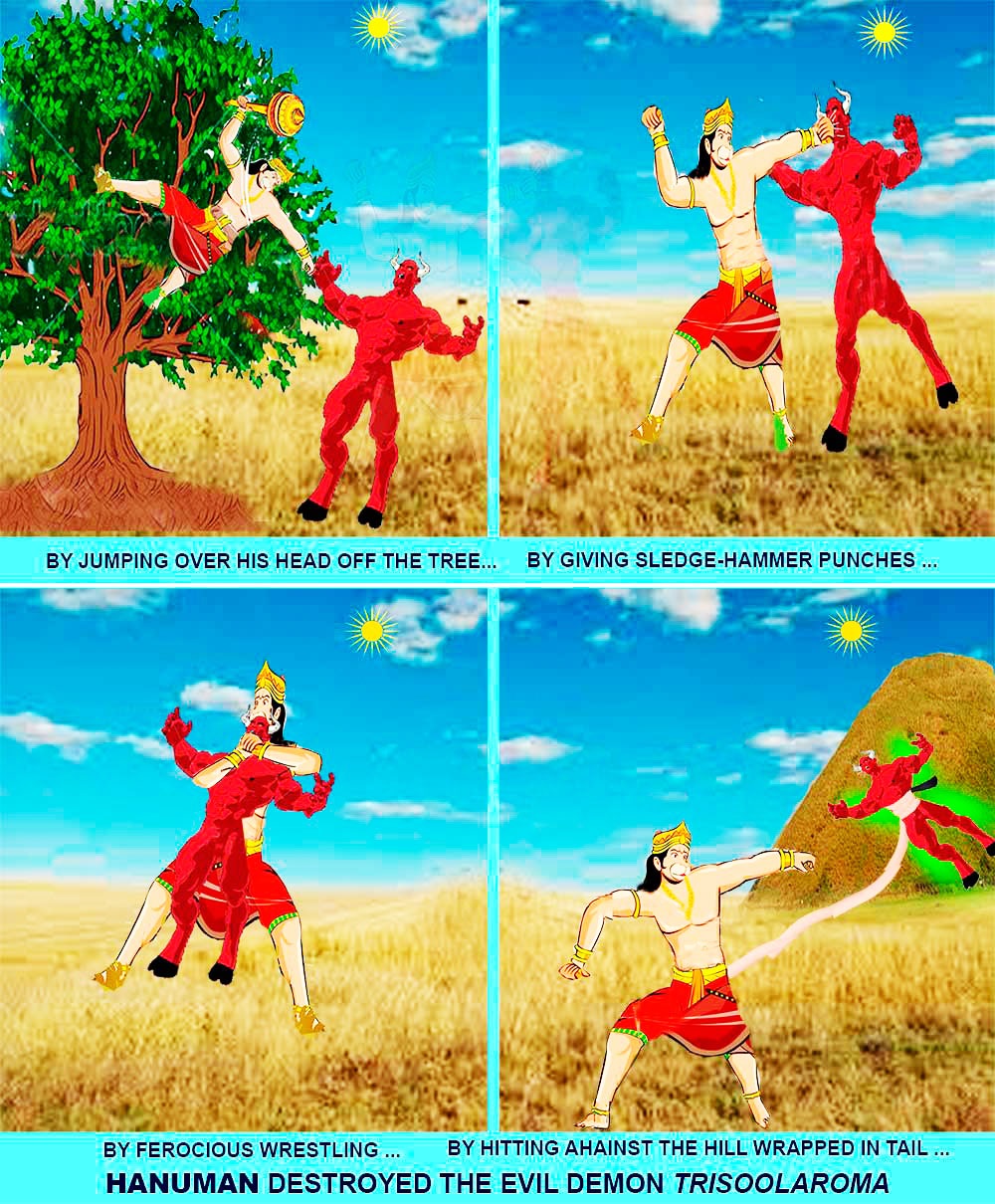
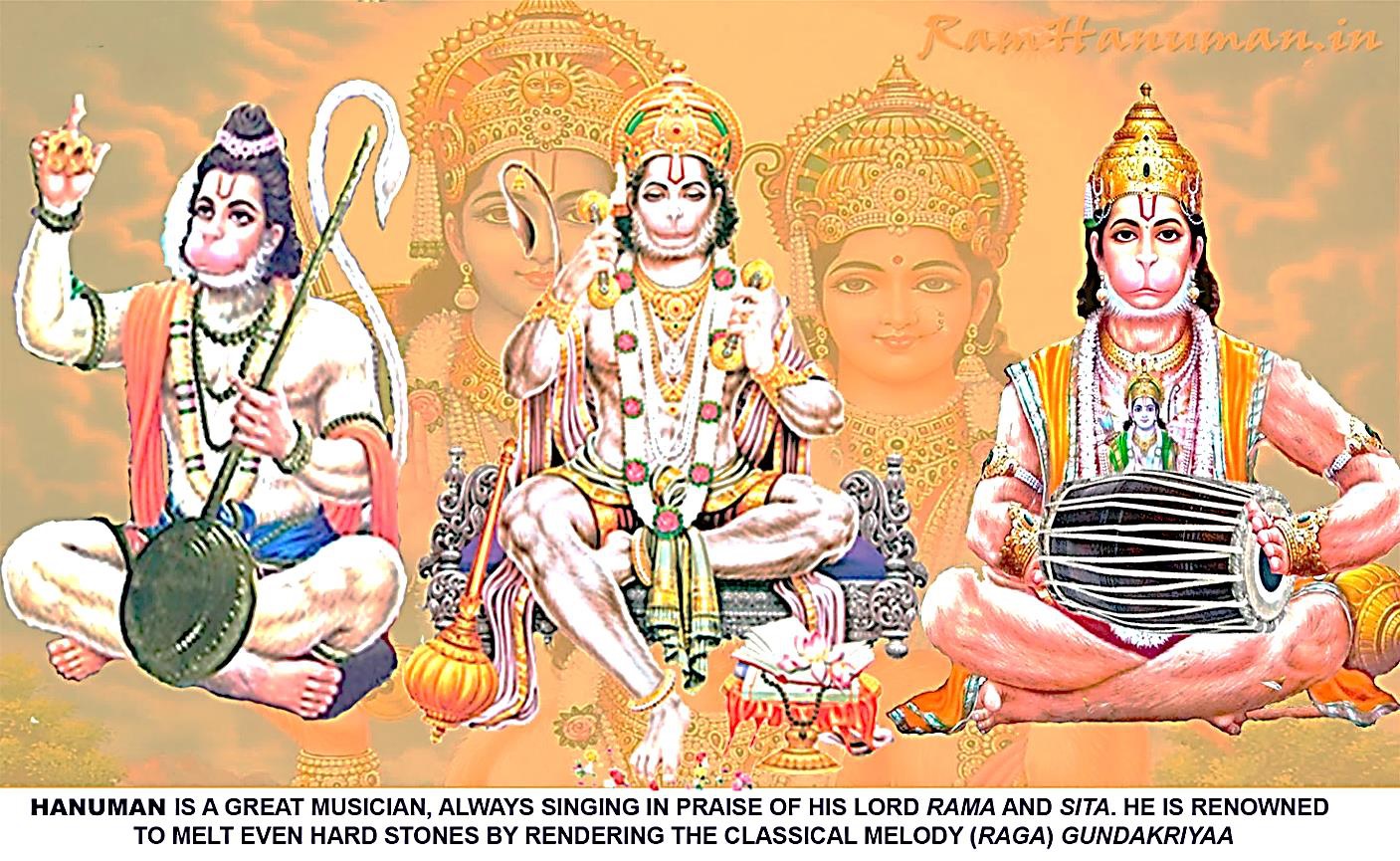
![]()

Click here to visit the Contents of the Part 1.
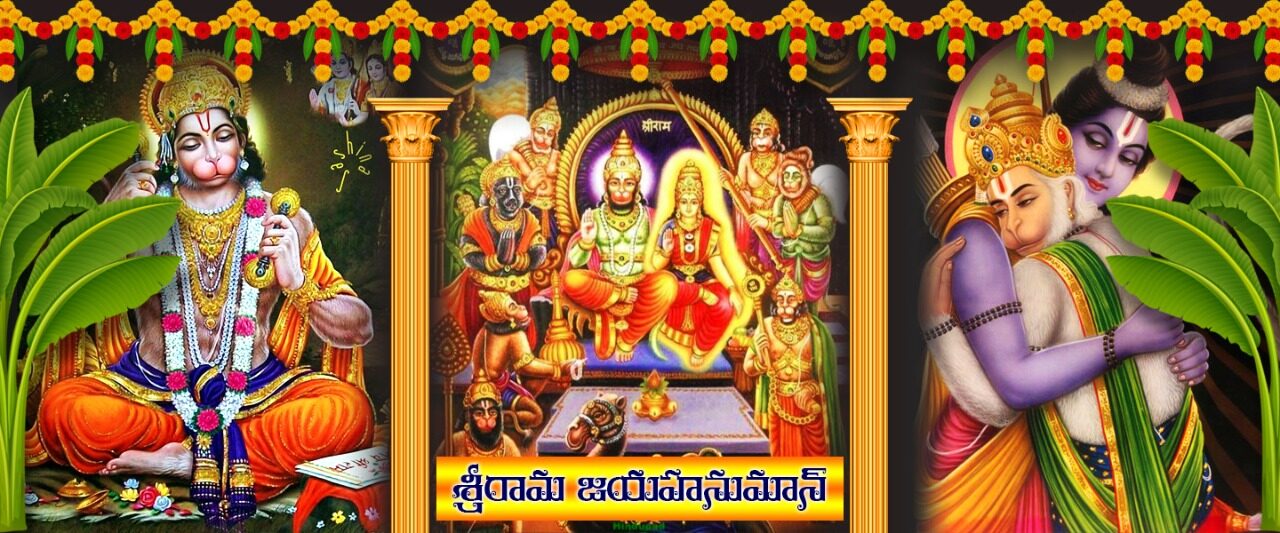

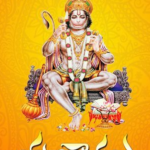

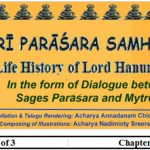

Be First to Comment